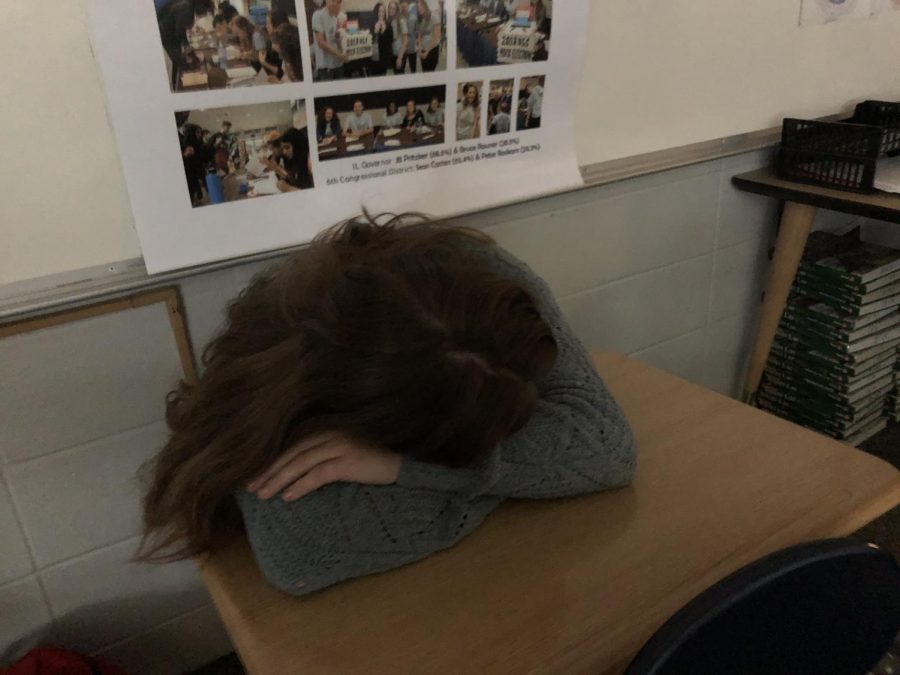The end of the semester stokes the flames of student burnout
November 11, 2021
A few ways to combat burnout as a student are by catching up on sleep, taking a break from screens and focusing on one assignment at a time.
As the end of the semester approaches, many students are starting to feel these effects of burnout as schoolwork, extracurricular activities and other obligations pile up to an unmanageable level. According to a study done by NYU, half of high school students feel a great deal of stress daily. This stress can lead to burnout, which is defined as physical or mental collapse caused by overwork or stress.
DGS Psychologist Catherine Robinson thinks that the levels of student burnout, and mental health overall, have been affected in recent months.
“Most definitely, especially within the last 20 months. The pandemic has exacerbated stress levels, motivation and mental health issues in adolescents and adults,” Robinson said.
Though students may feel stressed and burned out for different reasons throughout high school, Robinson believes that there is a mostly constant level of burnout across all grades within DGS.
“In my experience, I have observed burnout across all grade levels. A freshman may have different problems than a senior which is why it’s important for adolescents to practice self-care, access the resources available to them, and seek out academic/social-emotional support when needed,” Robinson said.
English teacher Nicole Proimos has seen a different trend in students’ stress and motivation levels across the grades.
“[I see it] particularly peaking junior year, which makes sense, because that’s when you’re supposed to decide your future, what college you’re going to go to, that’s when all the academic tests that really count [happen]. That’s a lot of pressure that year, on top of the fact that that’s typically the year that students start working a job on top of extracurricular activities.
Proimos also added that she sees a peak in burnout near the end of the semesters as students prepare to take their final exams.
“I think it’s because all the classes are coming together with final grades, and students are taking a step back and assessing where they’re at and where they want to be. So typically, there’s that final push. And when students do that or leave things to the last minute, or when everything’s culminating at once, it becomes more pressure,” Proimos said.
Sophomore Jordan Scott expressed that he feels less burned out this year than last year since he is involved in more fun extracurriculars that help to reduce his stress level.
“I feel less burnt out; I have a lot more activities to do,” Scott said.
Junior Iliyah Knox somewhat agrees that having more things to do can distract from burnout, but she added that having more things to do can sometimes add stress.
“It makes me stressed sometimes, but sometimes it encourages me to stay on top of things because if I miss something, I’ll be behind in everything. I like [having extracurriculars], but sometimes it is stressful,” Knox said.
According to the Sleep Foundation, “sleep benefits the brain and promotes attention, memory, and analytical thought” and “makes thinking sharper, recognizing the most important information to consolidate learning.” Knox describes sleeping as one of her favorite ways to deal with stress and lack of motivation.
“I think I sleep a lot. I’ll relax, and after homework, I’ll take a nap,” Knox said.
Students often don’t know how to deal with burnout and find themselves buried in a seemingly endless list of assignments. Proimos lists specific strategies that students may find useful when they are overwhelmed by their to-do lists.
“You hear a lot of people say, like, self-care, and in a time where everyone’s in this situation together, just kind of telling us to take care of ourselves isn’t good enough; we need actual strategies. And so I think for a lot of students, reaching out and reaching out early or reaching out often because the adults are feeling it, too. I think if you ask for help early on, teachers are able to work with you on those burnouts and use the new policies their schools have to give that leniency for turning in late work or asking for extensions,” Proimos said.
A few ways to combat burnout as a student are by catching up on sleep, taking a break from screens and focusing on one assignment at a time. DGS counselors and teachers are also always available for student support, and to help in any way they can.
